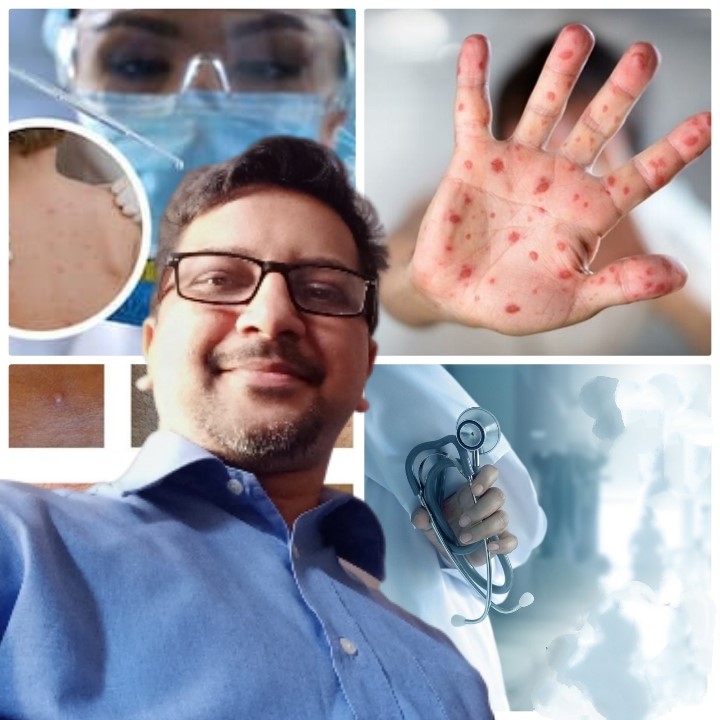Goa is abuzz with excitement as vintage bike and car owners, users, collectors and fans are decking […]

Monkeypox: Do not panic!
July 23- July 29 2022, MIND & BODY, HEART & SOUL July 22, 2022In focus : Take preventive steps but do not fear!
While we were just learning to live with the COVID-19 pandemic here comes the World Health Organisation with another announcement – it is declared monkeypox as Global Emergency as more than 70 countries have reported the virus ! Many don’t know whether to take it seriously or not but clue yourself up anyway about monkeypox. What does it mean to us? and how does it spread? DR AMIT DIAS of the Department of Preventive Medicine at the Goa Medical College throws light on the disease which could become the next pandemic….
Question: How widespread is this monkeypox globally and locally?
Dr Amit Dias: Monkeypox is not a new disease and has been occurring in several Central and Westarn African countries. Human monkeypox was first identified in humans in 1970 in the Democratic Republic of the Congo in a 9-month-old boy of the region. Cases have been occurring since then, but mainly restricted to the region. However, since May this year, monkeypox has been spreading rapidly around the world, mainly among gay and bisexual men. The World Health Network has declared it is a pandemic and the WHO has declared it Global Health emergency, since it is spreading across several countries.
It has now been detected in places where the disease has not been typically found before — in Europe, the Americas, Africa, the Western Pacific, Asia, and countries of the Eastern Mediterranean. This year, there has also been a higher incidence in those parts of Africa where cases have been previously reported — Democratic Republic of the Congo, Nigeria and the Central African Republic.
Q: Has Monkey-pox entered India ? Have we reported cases?
Answer: Yes. We have cases reported in India. These are imported cases. The first case of the disease was reported on July 14 — in a 35-year-old person returning from UAE.
A second case of monkey-pox infection — in a 31-year-old man who arrived in Kannur from Dubai on July 13 — was confirmed in Kerala on Monday (July 18).
The health department in Kerala has detected and taken immediate action. It has also put the concerned districts on high alert, including helpdesks at the airports.
Q: We have just barely survived the corona virus or Covid pandemic, are we heading for something similar?
A: No. Fortunately, monkeypox is a largely self-limiting disease — which means it will resolve itself on its own, and will leave no long-term harmful effects on a patient’s health. Majority of children and adults with healthy immune systems will not, even have severe illness. It does not spread as easily as the COVID-19 virus and therefore, can be kept under control if we are cautious. There are two distinct genetic clade of the monkeypox virus, namely, the Central African (Congo Basin) clade and the West African clade (clade in biology is a group of organisms believed to comprise all the evolutionary descendants of a common ancestor as in “the great ape and human clade”).
The disease is similar to smallpox which has been eradicated, but much milder. It is not related to chickenpox.
Q: How exactly does the monkeypox virus spread?
A: It is primarily transmitted from human-to-human, through large respiratory droplets. Transmission generally requires prolonged close contact with an infected individual. It can also be transmitted through direct or indirect contact with body fluids or lesion material, such as through contaminated clothing or linen. So avoiding close contact with infected individuals can help prevent the transmission. Health care workers are at an increased risk. The measures taken to prevent Covid-19 will help in preventing monkeypox as well.
Monkeypox is primarily a zoonotic disease— a disease that is transmitted from infected animals to humans. Animal-to-human transmission is the primary way in which the disease has spread in Africa, but the conditions for such transmission would be rare in India and less of a concern. Transmission can happen through the bite or scratch of infected animals like small mammals including rodents — rats, squirrels, etc. And non-human primates like monkeys and apes, or through bush meat preparation. Though it is called monkeypox, the exact source of the infection remains unknown.
The incubation period is usually 6-13 days — time taken to develop the disease after getting infected. Which is the reason why people may travel from one country to another during this incubation period and spread the virus.
Q: What are the clinical features of monkeypox?
A: Symptoms last between two and four weeks. During the first phase (0-5 days), patients can experience one of five symptoms: fever; headache; muscle aches; exhaustion; chills and/or sweats; and sore throat and cough. The second phase begins within 1-3 days of the onset of fever, and lasts for around 2-4 weeks. Lesions are often described as painful until the healing phase when they become itchy.
Q: Is there treatment for monkeypox?
A: There is no specific treatment for monkeypox yet. The patient has to be given supportive treatment, light dressing, depending on the symptoms. Those infected are advised to isolate immediately. If there is any suspicion, kindly consult your nearest health center for help.















